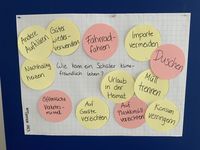News Detail
International Climate Policy and Individual Climate Protection Activities – High School Students Experience Theory and Practice in a Joint Workshop at the ZEW
During a visit to the ZEW – Leibniz Centre for European Economic Research in Mannheim, pupils from the Eschbach-Gymnasium in Stuttgart-Freiberg experienced the combination of economic theory and practical application and played an active role in shaping it. On Wednesday, 23 July 2019, the 11th-grade high school students exchanged ideas with ZEW researchers within the scope of their high school course in advanced economics, thus gaining exciting insights into the Institute's work, and also developed their own concrete proposals for individual climate protection activities.
Prof. Dr. Martin Kesternich, deputy head of the ZEW research area “Environmental and Resource Economics, Environmental Management”, welcomed the group of students at the ZEW and gave an overview of the work at the institute and in the research area. The students were taught why the coordination of climate protection activities at the global level remains a major challenge, but still functions as a central building block for a successful climate policy at the national level.
Afterwards, ZEW researcher Carina Fugger presented the project work at the ZEW using the example of the research project “The relevance of non-state actors for individual climate protection activities and climate policy”, which is funded by the BMBF. In particular, she addressed the diversity of the individual actors and their fields of action with regard to climate protection activities. The practical relevance of the research was illustrated by the anchoring of non-state actors in the UN climate protection agenda and the example of the city of Manchester.
In his speech, ZEW President Prof. Achim Wambach PhD encouraged the student group to use the current public debate to obtain comprehensive information on climate policy measures and to critically question the various initiatives.
The group of students then showed great creativity and commitment in the group work to develop concrete recommendations for action for individual commitment to climate protection. The manifold suggestions did not only include a reflected classification of one's own consumption patterns in the private environment, but also addressed the operationalisation of climate-friendly behaviour in the school context, for example by establishing pupils as climate protection managers.
In addition to the technical information, the prospective high school graduates had the opportunity to get to know the ZEW as a training institution and employer in various professions. Pupils as well as teacher found the teaching by ZEW experts was a welcome diversification in the everyday school life.


